Cost Planning & Management: Project Success in Construction
VerifiedAdded on 2023/06/04
|11
|2347
|376
Report
AI Summary
This report investigates the criteria for determining the success of a project in the building construction industry, focusing on scope, schedule, budget, team satisfaction, customer satisfaction, and quality. It discusses the role of the quantity surveyor (QS) in ensuring financial control and managing contractual relationships. The report recommends cost planning to mitigate financial risks and improve project outcomes by carefully evaluating initial project costs and cost-changing factors. It also emphasizes the impact of the project team's corrective and preventive measures, such as proactive risk management and accurate project tracking, in achieving financial success. The study concludes that a project's success depends on a comprehensive understanding of these factors and their effective management.

Running head: COST PLANNING
Cost Planning
Name of the Student:
Name of the University:
Author note:
Cost Planning
Name of the Student:
Name of the University:
Author note:
Paraphrase This Document
Need a fresh take? Get an instant paraphrase of this document with our AI Paraphraser
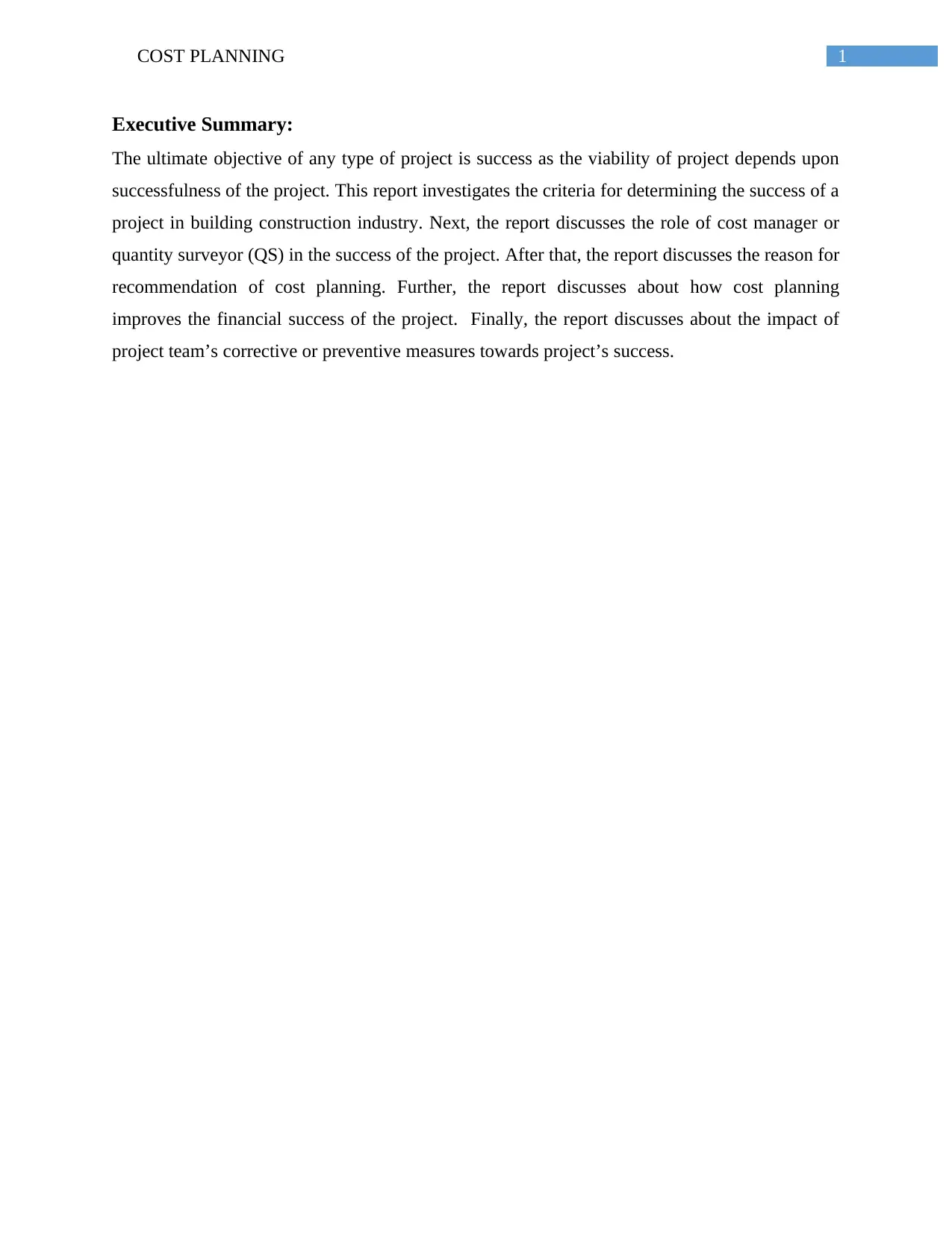
1COST PLANNING
Executive Summary:
The ultimate objective of any type of project is success as the viability of project depends upon
successfulness of the project. This report investigates the criteria for determining the success of a
project in building construction industry. Next, the report discusses the role of cost manager or
quantity surveyor (QS) in the success of the project. After that, the report discusses the reason for
recommendation of cost planning. Further, the report discusses about how cost planning
improves the financial success of the project. Finally, the report discusses about the impact of
project team’s corrective or preventive measures towards project’s success.
Executive Summary:
The ultimate objective of any type of project is success as the viability of project depends upon
successfulness of the project. This report investigates the criteria for determining the success of a
project in building construction industry. Next, the report discusses the role of cost manager or
quantity surveyor (QS) in the success of the project. After that, the report discusses the reason for
recommendation of cost planning. Further, the report discusses about how cost planning
improves the financial success of the project. Finally, the report discusses about the impact of
project team’s corrective or preventive measures towards project’s success.
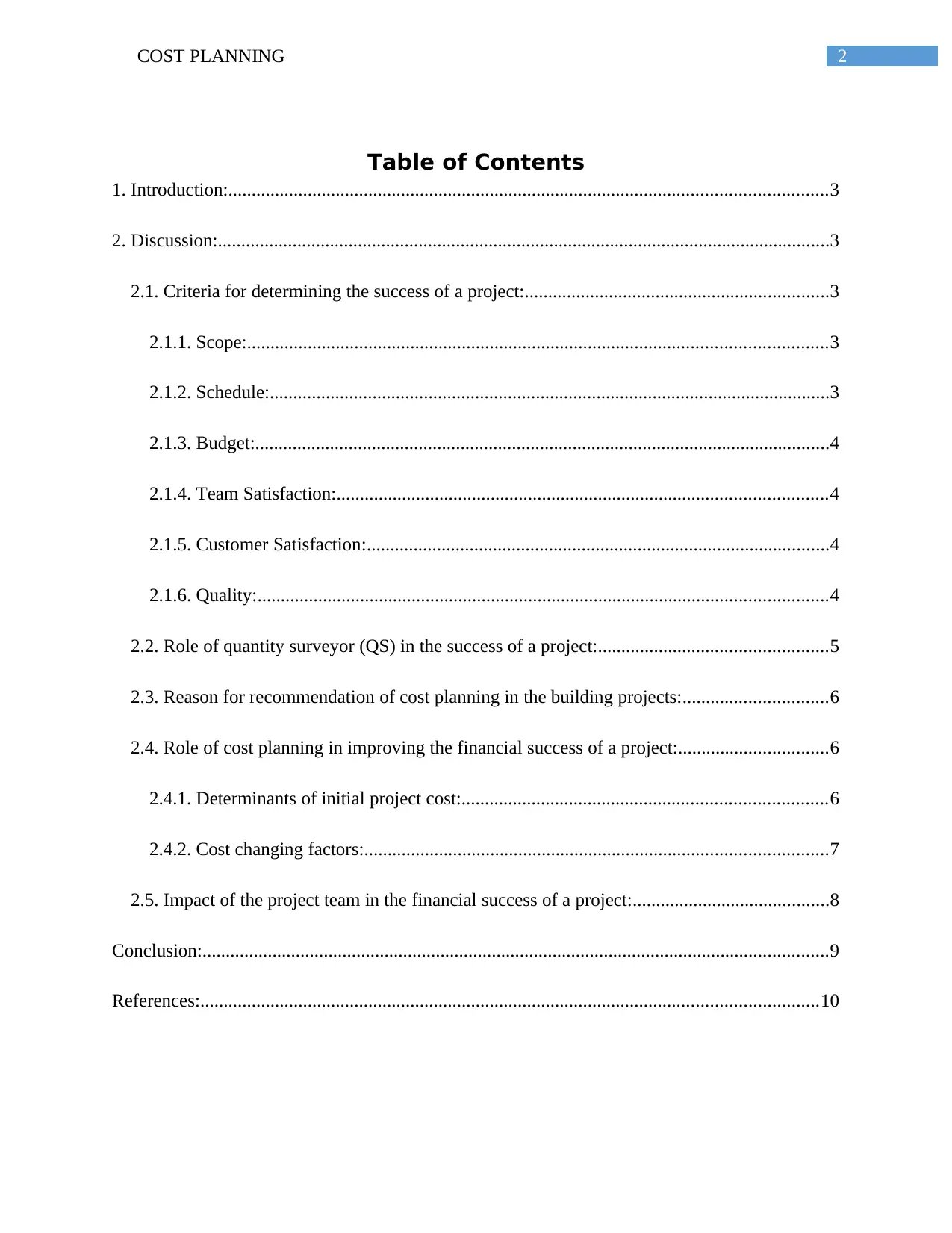
2COST PLANNING
Table of Contents
1. Introduction:................................................................................................................................3
2. Discussion:...................................................................................................................................3
2.1. Criteria for determining the success of a project:.................................................................3
2.1.1. Scope:............................................................................................................................3
2.1.2. Schedule:........................................................................................................................3
2.1.3. Budget:...........................................................................................................................4
2.1.4. Team Satisfaction:.........................................................................................................4
2.1.5. Customer Satisfaction:...................................................................................................4
2.1.6. Quality:..........................................................................................................................4
2.2. Role of quantity surveyor (QS) in the success of a project:.................................................5
2.3. Reason for recommendation of cost planning in the building projects:...............................6
2.4. Role of cost planning in improving the financial success of a project:................................6
2.4.1. Determinants of initial project cost:..............................................................................6
2.4.2. Cost changing factors:...................................................................................................7
2.5. Impact of the project team in the financial success of a project:..........................................8
Conclusion:......................................................................................................................................9
References:....................................................................................................................................10
Table of Contents
1. Introduction:................................................................................................................................3
2. Discussion:...................................................................................................................................3
2.1. Criteria for determining the success of a project:.................................................................3
2.1.1. Scope:............................................................................................................................3
2.1.2. Schedule:........................................................................................................................3
2.1.3. Budget:...........................................................................................................................4
2.1.4. Team Satisfaction:.........................................................................................................4
2.1.5. Customer Satisfaction:...................................................................................................4
2.1.6. Quality:..........................................................................................................................4
2.2. Role of quantity surveyor (QS) in the success of a project:.................................................5
2.3. Reason for recommendation of cost planning in the building projects:...............................6
2.4. Role of cost planning in improving the financial success of a project:................................6
2.4.1. Determinants of initial project cost:..............................................................................6
2.4.2. Cost changing factors:...................................................................................................7
2.5. Impact of the project team in the financial success of a project:..........................................8
Conclusion:......................................................................................................................................9
References:....................................................................................................................................10
⊘ This is a preview!⊘
Do you want full access?
Subscribe today to unlock all pages.

Trusted by 1+ million students worldwide
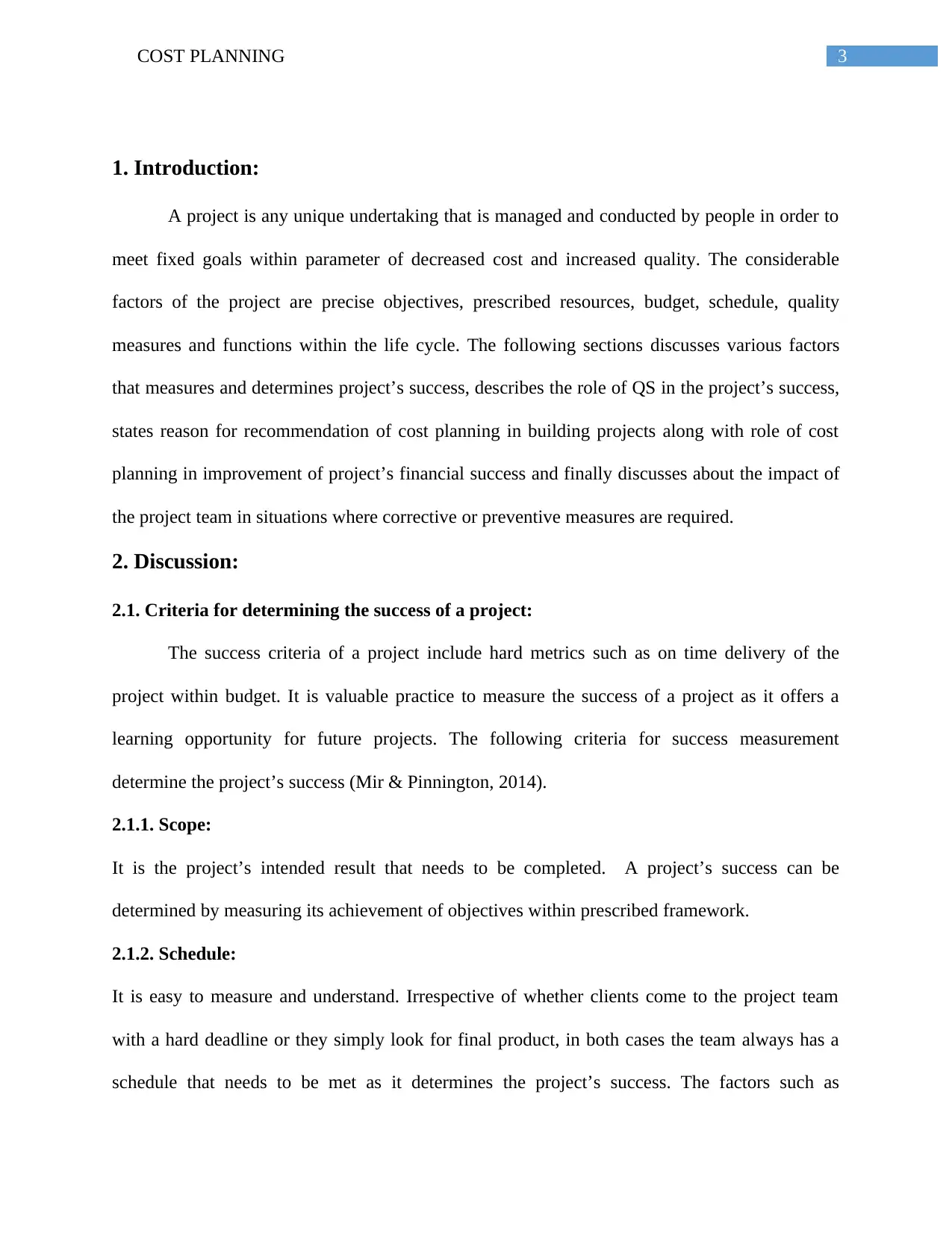
3COST PLANNING
1. Introduction:
A project is any unique undertaking that is managed and conducted by people in order to
meet fixed goals within parameter of decreased cost and increased quality. The considerable
factors of the project are precise objectives, prescribed resources, budget, schedule, quality
measures and functions within the life cycle. The following sections discusses various factors
that measures and determines project’s success, describes the role of QS in the project’s success,
states reason for recommendation of cost planning in building projects along with role of cost
planning in improvement of project’s financial success and finally discusses about the impact of
the project team in situations where corrective or preventive measures are required.
2. Discussion:
2.1. Criteria for determining the success of a project:
The success criteria of a project include hard metrics such as on time delivery of the
project within budget. It is valuable practice to measure the success of a project as it offers a
learning opportunity for future projects. The following criteria for success measurement
determine the project’s success (Mir & Pinnington, 2014).
2.1.1. Scope:
It is the project’s intended result that needs to be completed. A project’s success can be
determined by measuring its achievement of objectives within prescribed framework.
2.1.2. Schedule:
It is easy to measure and understand. Irrespective of whether clients come to the project team
with a hard deadline or they simply look for final product, in both cases the team always has a
schedule that needs to be met as it determines the project’s success. The factors such as
1. Introduction:
A project is any unique undertaking that is managed and conducted by people in order to
meet fixed goals within parameter of decreased cost and increased quality. The considerable
factors of the project are precise objectives, prescribed resources, budget, schedule, quality
measures and functions within the life cycle. The following sections discusses various factors
that measures and determines project’s success, describes the role of QS in the project’s success,
states reason for recommendation of cost planning in building projects along with role of cost
planning in improvement of project’s financial success and finally discusses about the impact of
the project team in situations where corrective or preventive measures are required.
2. Discussion:
2.1. Criteria for determining the success of a project:
The success criteria of a project include hard metrics such as on time delivery of the
project within budget. It is valuable practice to measure the success of a project as it offers a
learning opportunity for future projects. The following criteria for success measurement
determine the project’s success (Mir & Pinnington, 2014).
2.1.1. Scope:
It is the project’s intended result that needs to be completed. A project’s success can be
determined by measuring its achievement of objectives within prescribed framework.
2.1.2. Schedule:
It is easy to measure and understand. Irrespective of whether clients come to the project team
with a hard deadline or they simply look for final product, in both cases the team always has a
schedule that needs to be met as it determines the project’s success. The factors such as
Paraphrase This Document
Need a fresh take? Get an instant paraphrase of this document with our AI Paraphraser
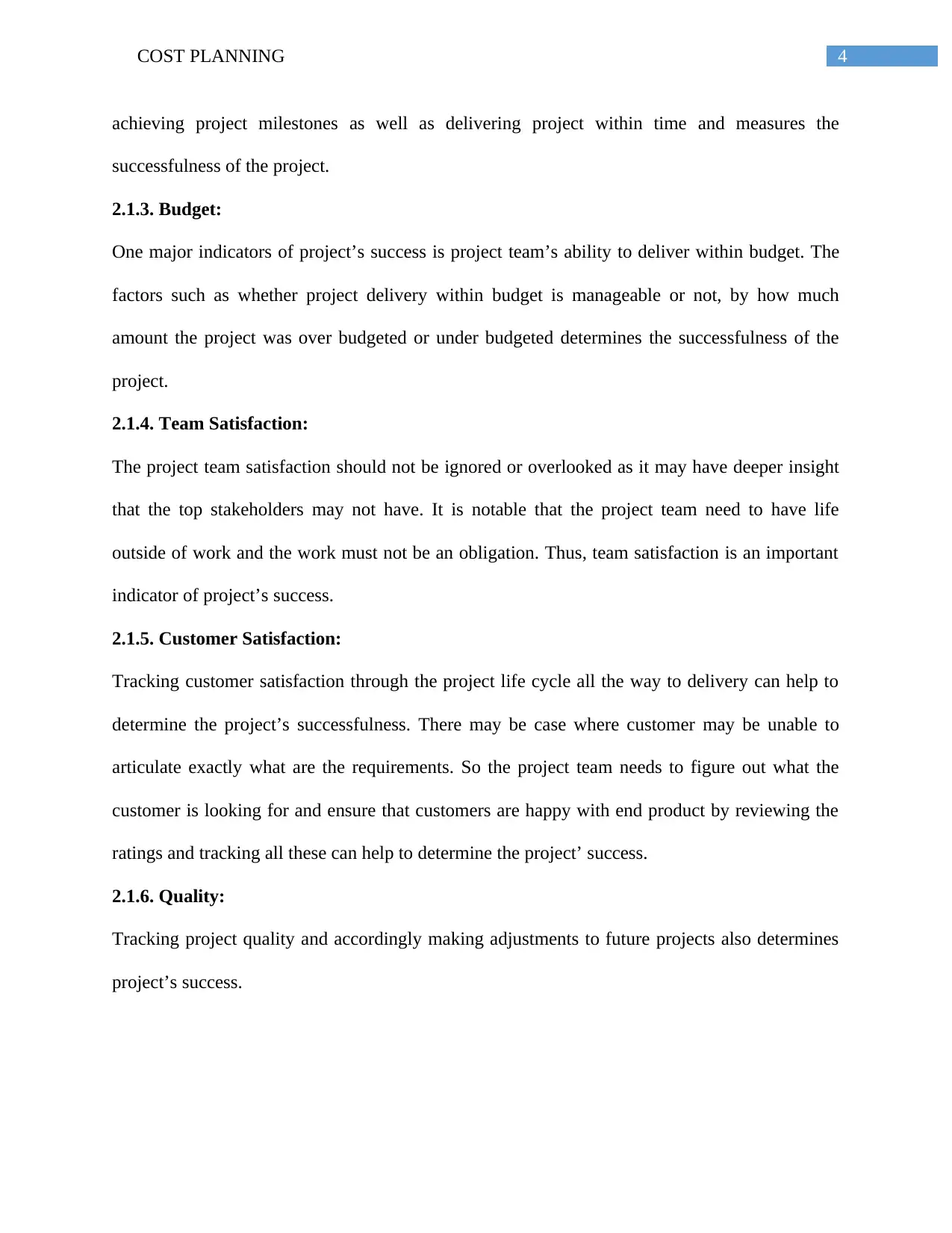
4COST PLANNING
achieving project milestones as well as delivering project within time and measures the
successfulness of the project.
2.1.3. Budget:
One major indicators of project’s success is project team’s ability to deliver within budget. The
factors such as whether project delivery within budget is manageable or not, by how much
amount the project was over budgeted or under budgeted determines the successfulness of the
project.
2.1.4. Team Satisfaction:
The project team satisfaction should not be ignored or overlooked as it may have deeper insight
that the top stakeholders may not have. It is notable that the project team need to have life
outside of work and the work must not be an obligation. Thus, team satisfaction is an important
indicator of project’s success.
2.1.5. Customer Satisfaction:
Tracking customer satisfaction through the project life cycle all the way to delivery can help to
determine the project’s successfulness. There may be case where customer may be unable to
articulate exactly what are the requirements. So the project team needs to figure out what the
customer is looking for and ensure that customers are happy with end product by reviewing the
ratings and tracking all these can help to determine the project’ success.
2.1.6. Quality:
Tracking project quality and accordingly making adjustments to future projects also determines
project’s success.
achieving project milestones as well as delivering project within time and measures the
successfulness of the project.
2.1.3. Budget:
One major indicators of project’s success is project team’s ability to deliver within budget. The
factors such as whether project delivery within budget is manageable or not, by how much
amount the project was over budgeted or under budgeted determines the successfulness of the
project.
2.1.4. Team Satisfaction:
The project team satisfaction should not be ignored or overlooked as it may have deeper insight
that the top stakeholders may not have. It is notable that the project team need to have life
outside of work and the work must not be an obligation. Thus, team satisfaction is an important
indicator of project’s success.
2.1.5. Customer Satisfaction:
Tracking customer satisfaction through the project life cycle all the way to delivery can help to
determine the project’s successfulness. There may be case where customer may be unable to
articulate exactly what are the requirements. So the project team needs to figure out what the
customer is looking for and ensure that customers are happy with end product by reviewing the
ratings and tracking all these can help to determine the project’ success.
2.1.6. Quality:
Tracking project quality and accordingly making adjustments to future projects also determines
project’s success.
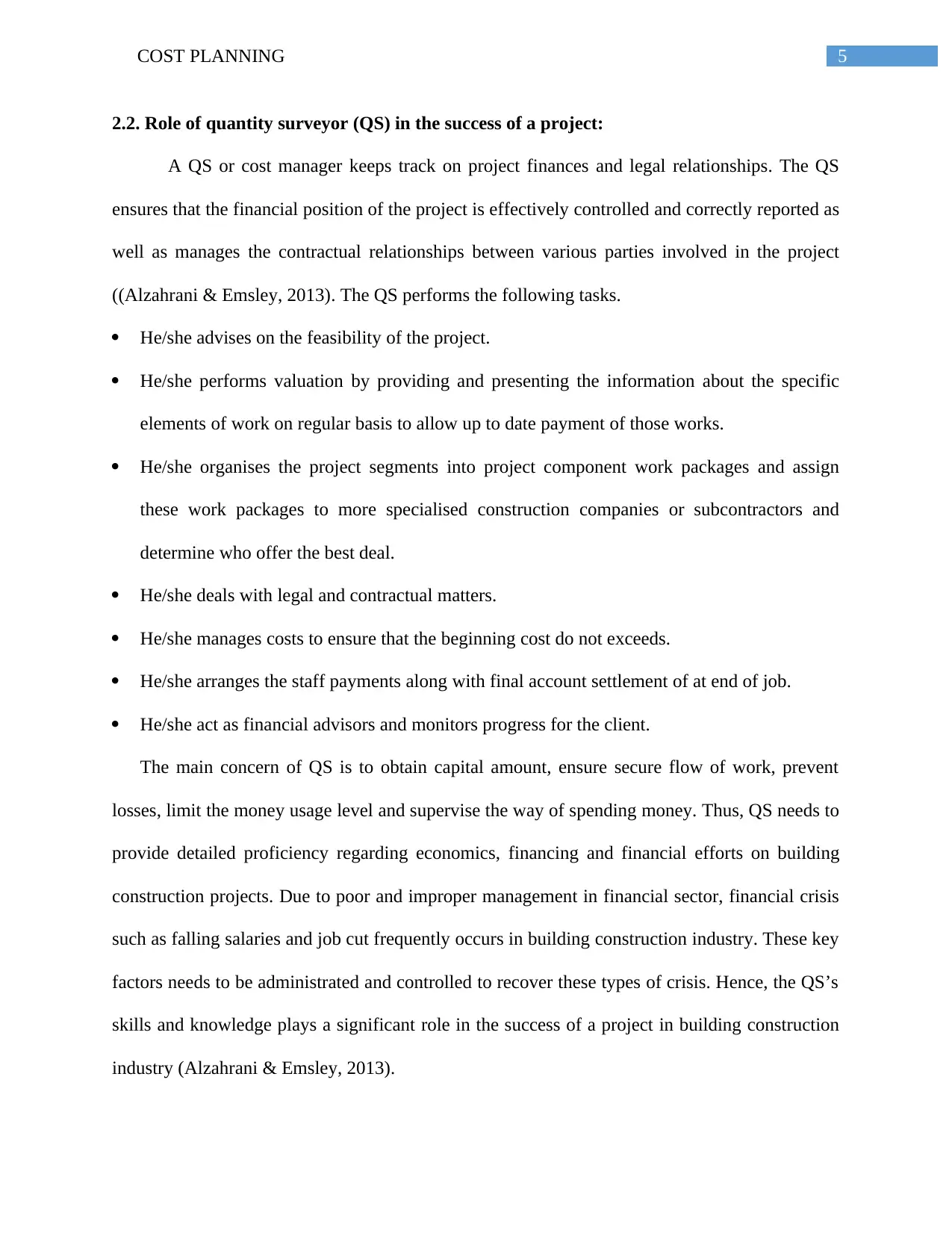
5COST PLANNING
2.2. Role of quantity surveyor (QS) in the success of a project:
A QS or cost manager keeps track on project finances and legal relationships. The QS
ensures that the financial position of the project is effectively controlled and correctly reported as
well as manages the contractual relationships between various parties involved in the project
((Alzahrani & Emsley, 2013). The QS performs the following tasks.
He/she advises on the feasibility of the project.
He/she performs valuation by providing and presenting the information about the specific
elements of work on regular basis to allow up to date payment of those works.
He/she organises the project segments into project component work packages and assign
these work packages to more specialised construction companies or subcontractors and
determine who offer the best deal.
He/she deals with legal and contractual matters.
He/she manages costs to ensure that the beginning cost do not exceeds.
He/she arranges the staff payments along with final account settlement of at end of job.
He/she act as financial advisors and monitors progress for the client.
The main concern of QS is to obtain capital amount, ensure secure flow of work, prevent
losses, limit the money usage level and supervise the way of spending money. Thus, QS needs to
provide detailed proficiency regarding economics, financing and financial efforts on building
construction projects. Due to poor and improper management in financial sector, financial crisis
such as falling salaries and job cut frequently occurs in building construction industry. These key
factors needs to be administrated and controlled to recover these types of crisis. Hence, the QS’s
skills and knowledge plays a significant role in the success of a project in building construction
industry (Alzahrani & Emsley, 2013).
2.2. Role of quantity surveyor (QS) in the success of a project:
A QS or cost manager keeps track on project finances and legal relationships. The QS
ensures that the financial position of the project is effectively controlled and correctly reported as
well as manages the contractual relationships between various parties involved in the project
((Alzahrani & Emsley, 2013). The QS performs the following tasks.
He/she advises on the feasibility of the project.
He/she performs valuation by providing and presenting the information about the specific
elements of work on regular basis to allow up to date payment of those works.
He/she organises the project segments into project component work packages and assign
these work packages to more specialised construction companies or subcontractors and
determine who offer the best deal.
He/she deals with legal and contractual matters.
He/she manages costs to ensure that the beginning cost do not exceeds.
He/she arranges the staff payments along with final account settlement of at end of job.
He/she act as financial advisors and monitors progress for the client.
The main concern of QS is to obtain capital amount, ensure secure flow of work, prevent
losses, limit the money usage level and supervise the way of spending money. Thus, QS needs to
provide detailed proficiency regarding economics, financing and financial efforts on building
construction projects. Due to poor and improper management in financial sector, financial crisis
such as falling salaries and job cut frequently occurs in building construction industry. These key
factors needs to be administrated and controlled to recover these types of crisis. Hence, the QS’s
skills and knowledge plays a significant role in the success of a project in building construction
industry (Alzahrani & Emsley, 2013).
⊘ This is a preview!⊘
Do you want full access?
Subscribe today to unlock all pages.

Trusted by 1+ million students worldwide
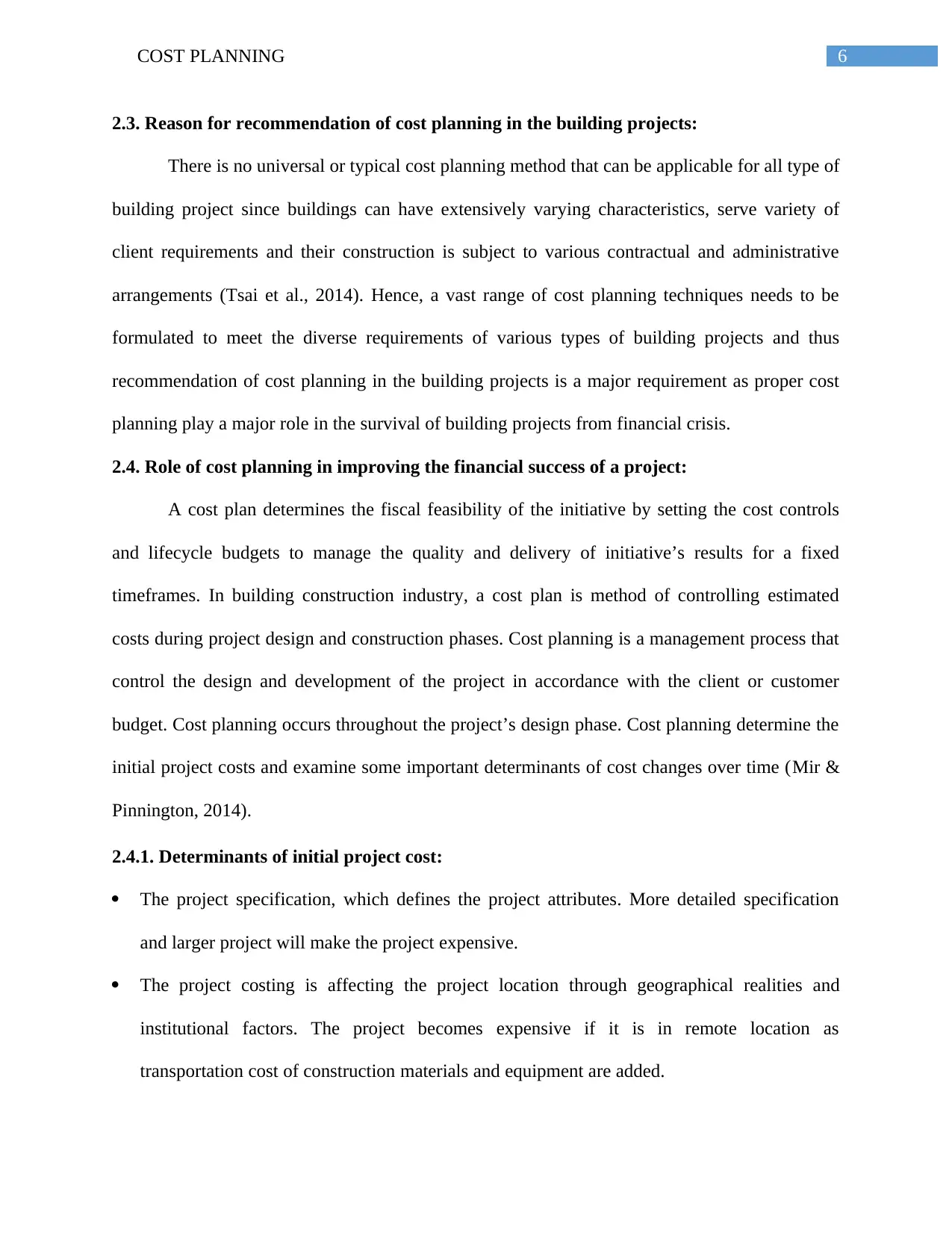
6COST PLANNING
2.3. Reason for recommendation of cost planning in the building projects:
There is no universal or typical cost planning method that can be applicable for all type of
building project since buildings can have extensively varying characteristics, serve variety of
client requirements and their construction is subject to various contractual and administrative
arrangements (Tsai et al., 2014). Hence, a vast range of cost planning techniques needs to be
formulated to meet the diverse requirements of various types of building projects and thus
recommendation of cost planning in the building projects is a major requirement as proper cost
planning play a major role in the survival of building projects from financial crisis.
2.4. Role of cost planning in improving the financial success of a project:
A cost plan determines the fiscal feasibility of the initiative by setting the cost controls
and lifecycle budgets to manage the quality and delivery of initiative’s results for a fixed
timeframes. In building construction industry, a cost plan is method of controlling estimated
costs during project design and construction phases. Cost planning is a management process that
control the design and development of the project in accordance with the client or customer
budget. Cost planning occurs throughout the project’s design phase. Cost planning determine the
initial project costs and examine some important determinants of cost changes over time (Mir &
Pinnington, 2014).
2.4.1. Determinants of initial project cost:
The project specification, which defines the project attributes. More detailed specification
and larger project will make the project expensive.
The project costing is affecting the project location through geographical realities and
institutional factors. The project becomes expensive if it is in remote location as
transportation cost of construction materials and equipment are added.
2.3. Reason for recommendation of cost planning in the building projects:
There is no universal or typical cost planning method that can be applicable for all type of
building project since buildings can have extensively varying characteristics, serve variety of
client requirements and their construction is subject to various contractual and administrative
arrangements (Tsai et al., 2014). Hence, a vast range of cost planning techniques needs to be
formulated to meet the diverse requirements of various types of building projects and thus
recommendation of cost planning in the building projects is a major requirement as proper cost
planning play a major role in the survival of building projects from financial crisis.
2.4. Role of cost planning in improving the financial success of a project:
A cost plan determines the fiscal feasibility of the initiative by setting the cost controls
and lifecycle budgets to manage the quality and delivery of initiative’s results for a fixed
timeframes. In building construction industry, a cost plan is method of controlling estimated
costs during project design and construction phases. Cost planning is a management process that
control the design and development of the project in accordance with the client or customer
budget. Cost planning occurs throughout the project’s design phase. Cost planning determine the
initial project costs and examine some important determinants of cost changes over time (Mir &
Pinnington, 2014).
2.4.1. Determinants of initial project cost:
The project specification, which defines the project attributes. More detailed specification
and larger project will make the project expensive.
The project costing is affecting the project location through geographical realities and
institutional factors. The project becomes expensive if it is in remote location as
transportation cost of construction materials and equipment are added.
Paraphrase This Document
Need a fresh take? Get an instant paraphrase of this document with our AI Paraphraser
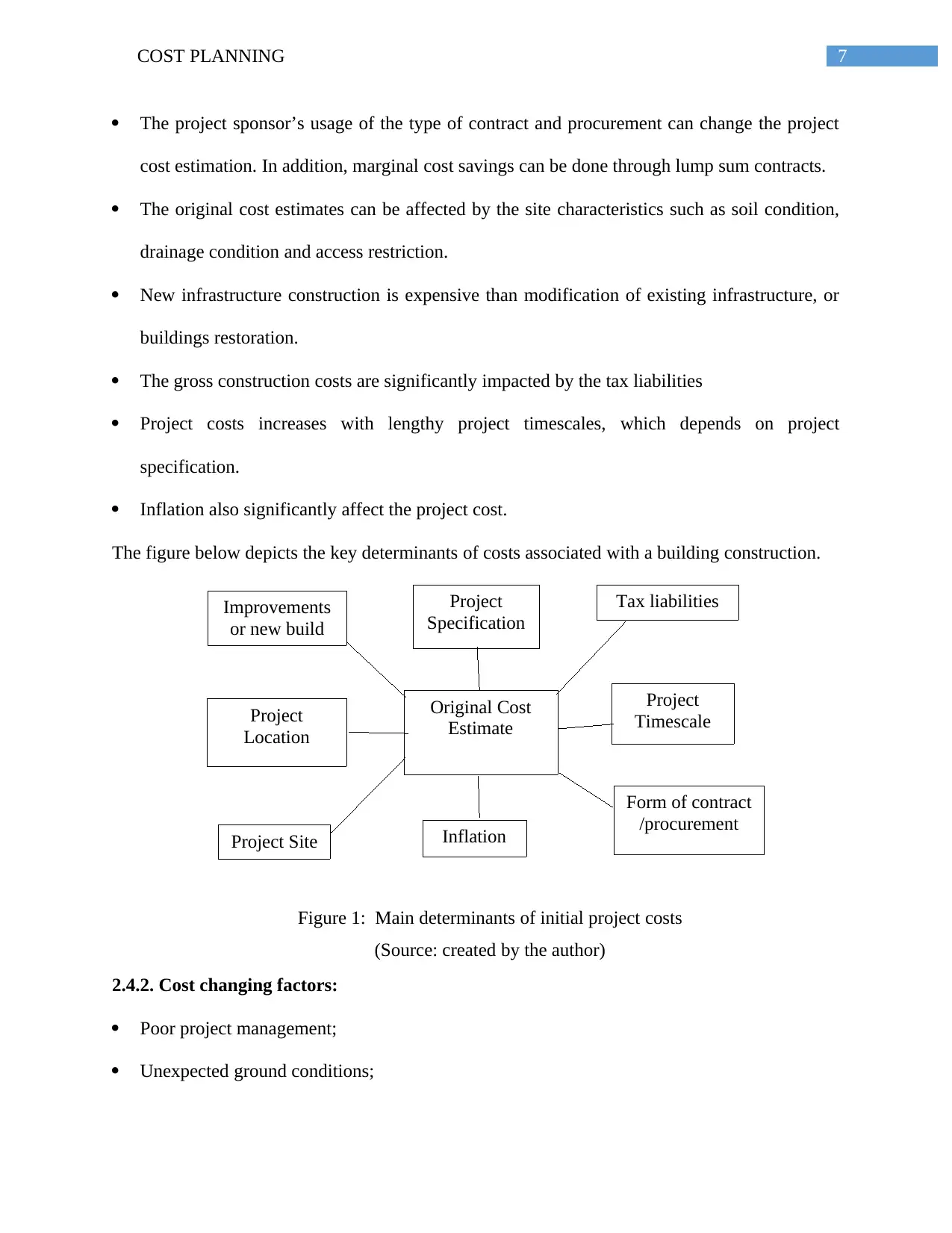
7COST PLANNING
The project sponsor’s usage of the type of contract and procurement can change the project
cost estimation. In addition, marginal cost savings can be done through lump sum contracts.
The original cost estimates can be affected by the site characteristics such as soil condition,
drainage condition and access restriction.
New infrastructure construction is expensive than modification of existing infrastructure, or
buildings restoration.
The gross construction costs are significantly impacted by the tax liabilities
Project costs increases with lengthy project timescales, which depends on project
specification.
Inflation also significantly affect the project cost.
The figure below depicts the key determinants of costs associated with a building construction.
Figure 1: Main determinants of initial project costs
(Source: created by the author)
2.4.2. Cost changing factors:
Poor project management;
Unexpected ground conditions;
Project
Location
Project
Specification
Tax liabilities
Project Site
Original Cost
Estimate
Project
Timescale
Improvements
or new build
Inflation
Form of contract
/procurement
The project sponsor’s usage of the type of contract and procurement can change the project
cost estimation. In addition, marginal cost savings can be done through lump sum contracts.
The original cost estimates can be affected by the site characteristics such as soil condition,
drainage condition and access restriction.
New infrastructure construction is expensive than modification of existing infrastructure, or
buildings restoration.
The gross construction costs are significantly impacted by the tax liabilities
Project costs increases with lengthy project timescales, which depends on project
specification.
Inflation also significantly affect the project cost.
The figure below depicts the key determinants of costs associated with a building construction.
Figure 1: Main determinants of initial project costs
(Source: created by the author)
2.4.2. Cost changing factors:
Poor project management;
Unexpected ground conditions;
Project
Location
Project
Specification
Tax liabilities
Project Site
Original Cost
Estimate
Project
Timescale
Improvements
or new build
Inflation
Form of contract
/procurement
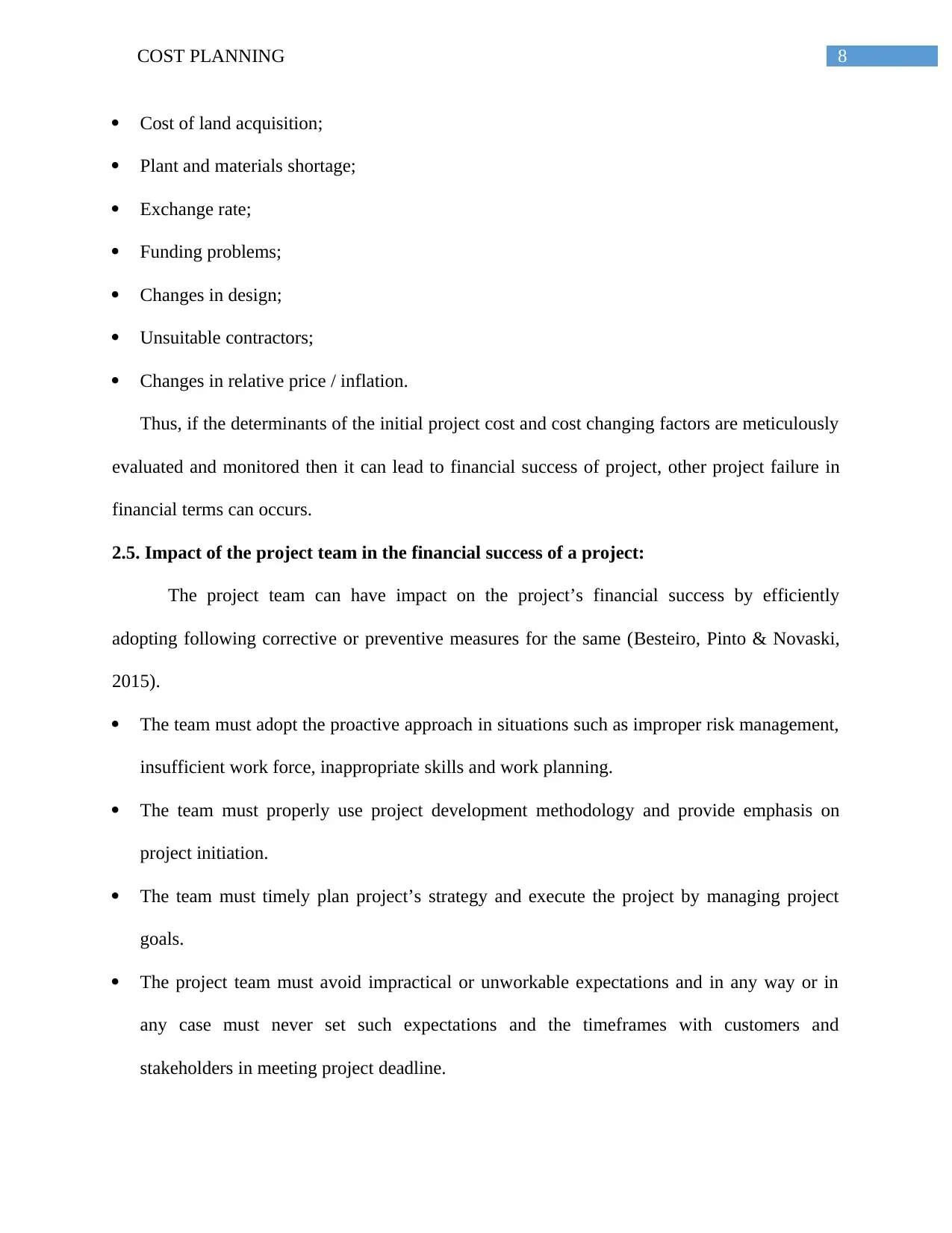
8COST PLANNING
Cost of land acquisition;
Plant and materials shortage;
Exchange rate;
Funding problems;
Changes in design;
Unsuitable contractors;
Changes in relative price / inflation.
Thus, if the determinants of the initial project cost and cost changing factors are meticulously
evaluated and monitored then it can lead to financial success of project, other project failure in
financial terms can occurs.
2.5. Impact of the project team in the financial success of a project:
The project team can have impact on the project’s financial success by efficiently
adopting following corrective or preventive measures for the same (Besteiro, Pinto & Novaski,
2015).
The team must adopt the proactive approach in situations such as improper risk management,
insufficient work force, inappropriate skills and work planning.
The team must properly use project development methodology and provide emphasis on
project initiation.
The team must timely plan project’s strategy and execute the project by managing project
goals.
The project team must avoid impractical or unworkable expectations and in any way or in
any case must never set such expectations and the timeframes with customers and
stakeholders in meeting project deadline.
Cost of land acquisition;
Plant and materials shortage;
Exchange rate;
Funding problems;
Changes in design;
Unsuitable contractors;
Changes in relative price / inflation.
Thus, if the determinants of the initial project cost and cost changing factors are meticulously
evaluated and monitored then it can lead to financial success of project, other project failure in
financial terms can occurs.
2.5. Impact of the project team in the financial success of a project:
The project team can have impact on the project’s financial success by efficiently
adopting following corrective or preventive measures for the same (Besteiro, Pinto & Novaski,
2015).
The team must adopt the proactive approach in situations such as improper risk management,
insufficient work force, inappropriate skills and work planning.
The team must properly use project development methodology and provide emphasis on
project initiation.
The team must timely plan project’s strategy and execute the project by managing project
goals.
The project team must avoid impractical or unworkable expectations and in any way or in
any case must never set such expectations and the timeframes with customers and
stakeholders in meeting project deadline.
⊘ This is a preview!⊘
Do you want full access?
Subscribe today to unlock all pages.

Trusted by 1+ million students worldwide
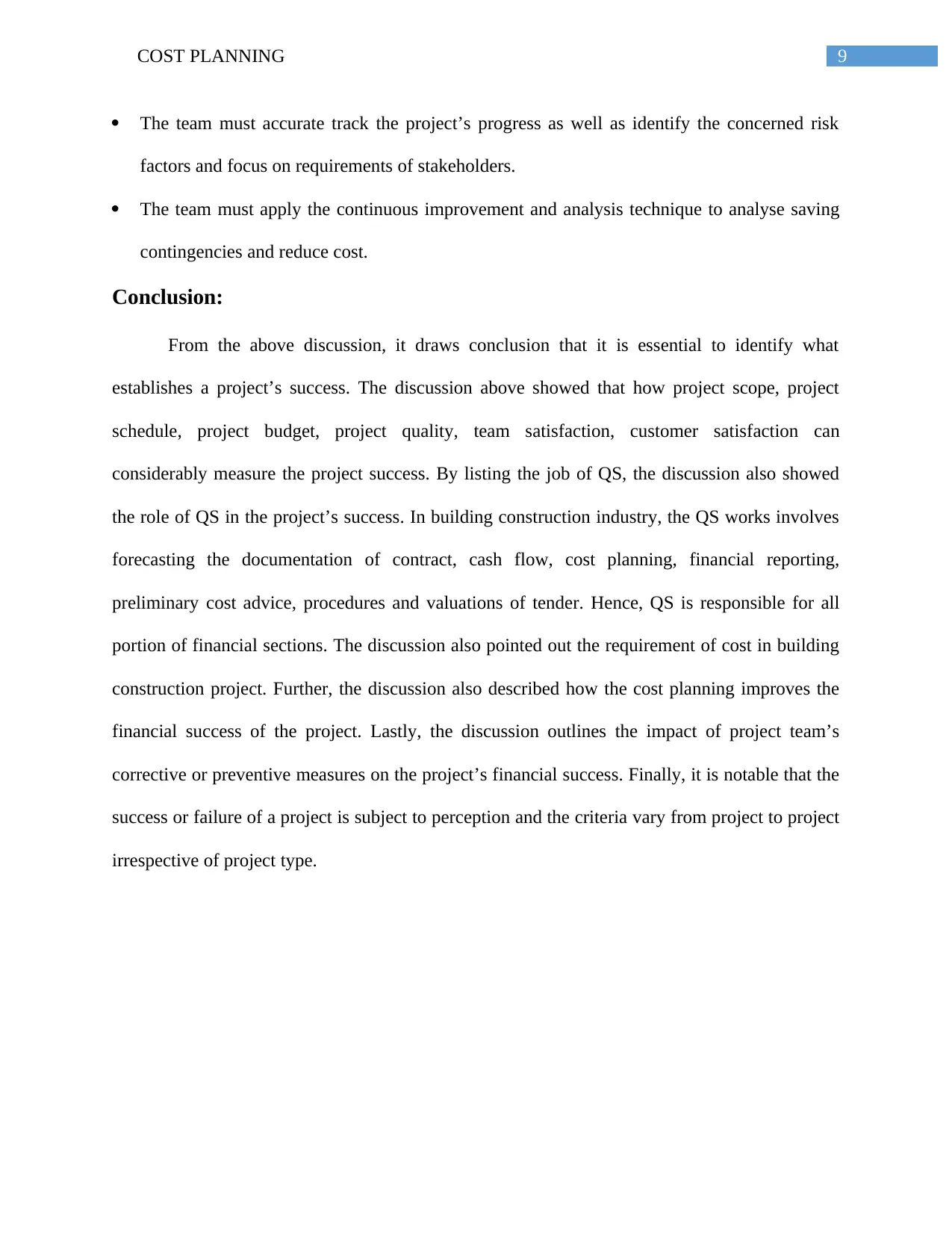
9COST PLANNING
The team must accurate track the project’s progress as well as identify the concerned risk
factors and focus on requirements of stakeholders.
The team must apply the continuous improvement and analysis technique to analyse saving
contingencies and reduce cost.
Conclusion:
From the above discussion, it draws conclusion that it is essential to identify what
establishes a project’s success. The discussion above showed that how project scope, project
schedule, project budget, project quality, team satisfaction, customer satisfaction can
considerably measure the project success. By listing the job of QS, the discussion also showed
the role of QS in the project’s success. In building construction industry, the QS works involves
forecasting the documentation of contract, cash flow, cost planning, financial reporting,
preliminary cost advice, procedures and valuations of tender. Hence, QS is responsible for all
portion of financial sections. The discussion also pointed out the requirement of cost in building
construction project. Further, the discussion also described how the cost planning improves the
financial success of the project. Lastly, the discussion outlines the impact of project team’s
corrective or preventive measures on the project’s financial success. Finally, it is notable that the
success or failure of a project is subject to perception and the criteria vary from project to project
irrespective of project type.
The team must accurate track the project’s progress as well as identify the concerned risk
factors and focus on requirements of stakeholders.
The team must apply the continuous improvement and analysis technique to analyse saving
contingencies and reduce cost.
Conclusion:
From the above discussion, it draws conclusion that it is essential to identify what
establishes a project’s success. The discussion above showed that how project scope, project
schedule, project budget, project quality, team satisfaction, customer satisfaction can
considerably measure the project success. By listing the job of QS, the discussion also showed
the role of QS in the project’s success. In building construction industry, the QS works involves
forecasting the documentation of contract, cash flow, cost planning, financial reporting,
preliminary cost advice, procedures and valuations of tender. Hence, QS is responsible for all
portion of financial sections. The discussion also pointed out the requirement of cost in building
construction project. Further, the discussion also described how the cost planning improves the
financial success of the project. Lastly, the discussion outlines the impact of project team’s
corrective or preventive measures on the project’s financial success. Finally, it is notable that the
success or failure of a project is subject to perception and the criteria vary from project to project
irrespective of project type.
Paraphrase This Document
Need a fresh take? Get an instant paraphrase of this document with our AI Paraphraser
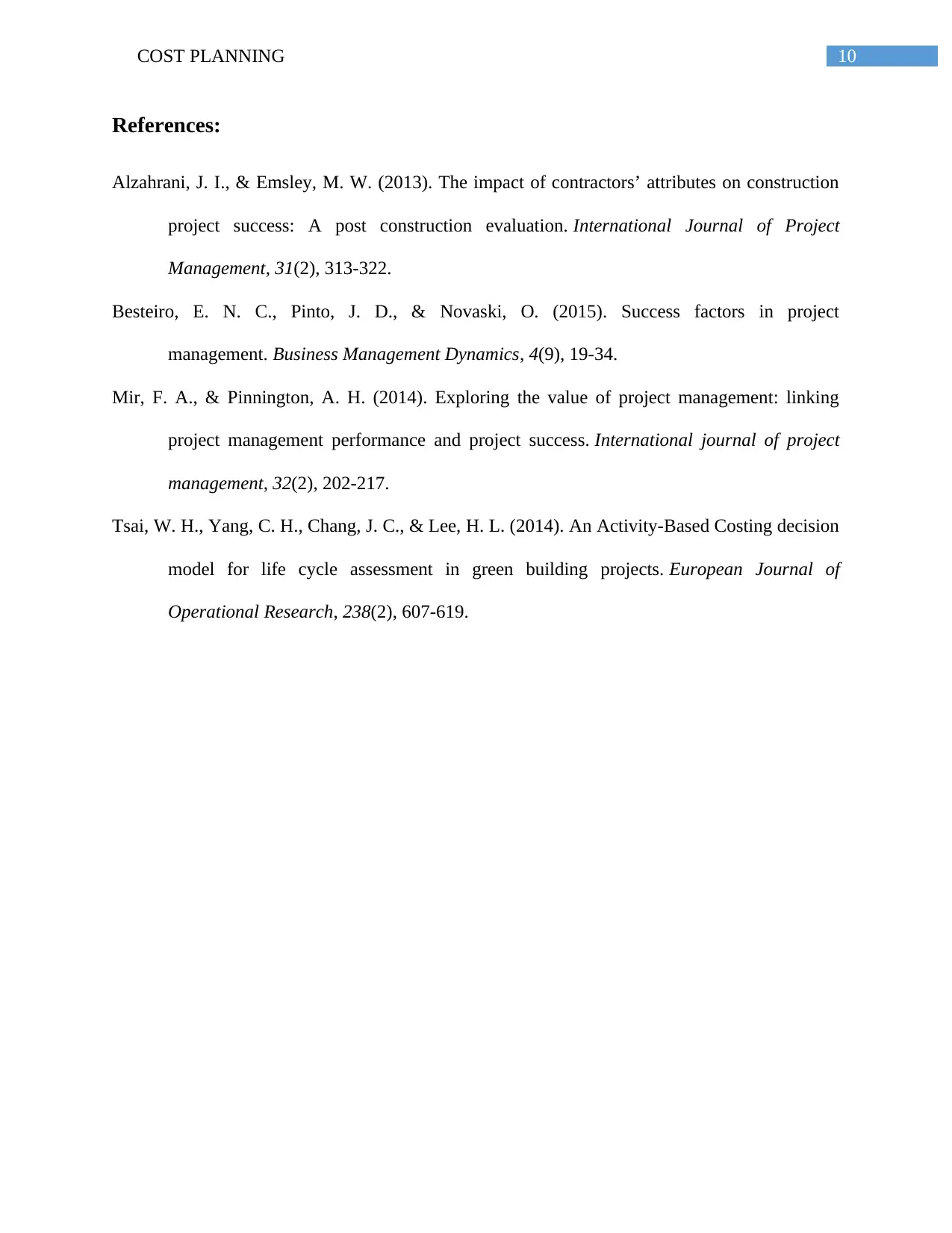
10COST PLANNING
References:
Alzahrani, J. I., & Emsley, M. W. (2013). The impact of contractors’ attributes on construction
project success: A post construction evaluation. International Journal of Project
Management, 31(2), 313-322.
Besteiro, E. N. C., Pinto, J. D., & Novaski, O. (2015). Success factors in project
management. Business Management Dynamics, 4(9), 19-34.
Mir, F. A., & Pinnington, A. H. (2014). Exploring the value of project management: linking
project management performance and project success. International journal of project
management, 32(2), 202-217.
Tsai, W. H., Yang, C. H., Chang, J. C., & Lee, H. L. (2014). An Activity-Based Costing decision
model for life cycle assessment in green building projects. European Journal of
Operational Research, 238(2), 607-619.
References:
Alzahrani, J. I., & Emsley, M. W. (2013). The impact of contractors’ attributes on construction
project success: A post construction evaluation. International Journal of Project
Management, 31(2), 313-322.
Besteiro, E. N. C., Pinto, J. D., & Novaski, O. (2015). Success factors in project
management. Business Management Dynamics, 4(9), 19-34.
Mir, F. A., & Pinnington, A. H. (2014). Exploring the value of project management: linking
project management performance and project success. International journal of project
management, 32(2), 202-217.
Tsai, W. H., Yang, C. H., Chang, J. C., & Lee, H. L. (2014). An Activity-Based Costing decision
model for life cycle assessment in green building projects. European Journal of
Operational Research, 238(2), 607-619.
1 out of 11
Related Documents
Your All-in-One AI-Powered Toolkit for Academic Success.
+13062052269
info@desklib.com
Available 24*7 on WhatsApp / Email
![[object Object]](/_next/static/media/star-bottom.7253800d.svg)
Unlock your academic potential
Copyright © 2020–2026 A2Z Services. All Rights Reserved. Developed and managed by ZUCOL.





